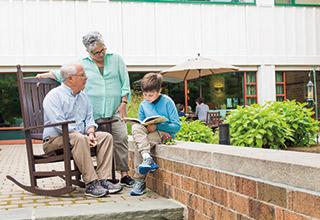Research Shows that Optimism May Support Good Health as You Age
Learn tips for cultivating optimism

We’ve all heard the saying “every cloud has a silver lining” or know someone who sees a glass half full when others see it half empty. People who hold this view of life are often considered optimists, and beyond promoting a sunny disposition, research shows that optimism seems to also be good for your health, as well as to the practice of medicine itself.
As early as 1910, a physician and president of the College of Physicians and Surgeons named Dr. E.L. Trudeau gave a talk to his colleagues in which he identified optimism as an important element in medical practice. He believed that an optimistic physician conveys his attitude to patients, and this interaction enhances both healing and recovery for the patient. It’s certainly an approach I take with my patients at Hebrew Rehabilitation Center, where I work as a geriatric psychiatrist.
As studies continue to demonstrate the positive influence optimism has on both physical and mental health, promoting it as an element of overall wellness has important public health implications. Particularly as longevity increases, staying healthy in body and mind with increased age not only impacts quality of life for individuals, but also reduces the burden of health care costs for all of us.
What is optimism?
To explore this phenomenon, let’s begin by defining what we mean by optimism. Simply stated, optimists have positive expectations for the future. Optimism is both associated with cognition and mood or underlying feelings and is related to hope, a sense of self-worth and control over one’s life, and happiness.
Optimism influences how people feel when they encounter problems. When confronting difficulty, people's emotions range from enthusiasm and eagerness to anger, anxiety, and depression. Optimists expect good outcomes, even when things are hard. They are more likely to agree with statements like, “In the future I expect I will succeed at most things I try,” and disagree with declarations like “I find that no matter how hard I try‚ things just don’t turn out the way I would like.”
The connections between optimism and health
Studies spanning the last three decades suggest optimism has a positive impact on a number of health outcomes. The first study to link optimism to an objective physical health outcome came from a group of patients who were recovering from coronary artery bypass graft surgery. The study reported that analyses of EKGs and blood enzymes indicated that patients higher in optimism were significantly less likely than those lower in optimism to have suffered a heart attack during their surgery. And yet another study indicated that optimism predicted the rate of wound healing and progression of atherosclerosis and HIV disease.
Data generated by epidemiological studies has been particularly striking. One of the largest studies involving optimism looked at women participating in the Women’s Health Initiative and found optimists were less likely than pessimists to develop new cases of coronary heart disease (CHD), less likely to die from CHD-related causes, and lived longer in general.
Does optimism help people live longer?
While the beneficial influence of optimism measured among adults between age 70 and 80 has been observed in some studies, contradictory results also exist, and we know very little about how optimism impacts those beyond the age of 85 years. So, the question becomes is optimism protective throughout life?
A paper published as recently as February 2021 in the Journals of Gerontology: Medical Sciences answers with a resounding “yes.” The study measured optimism in older adults at both 85 and 90 years of age and found a significant association between optimism and survival.
Why are optimists healthier?
When you look at the qualities that define an optimistic person, certain common-sense factors emerge to explain the correlation. If you’re more optimistic about the future than someone who is pessimistic, it stands to reason that you’ll probably be more likely to practice healthier behaviors that help you feel well and promote longevity, including eating a healthy diet, engaging in regular physical activity, taking medications as prescribed, and not smoking. These habits illustrate how optimism can influence determinants of cardiac health such as blood pressure, lipids, and inflammatory markers.
On an emotional level, optimists also demonstrate better perseverance and ability to cope with setbacks, which can lower stress levels and again encourage a healthy lifestyle. Let’s face it, most of us prefer being around people who enjoy life. So optimistic people tend to have strong social networks that have also been found as key to well-being.
Tips for cultivating an optimistic view
Studies indicate that optimism, and the opposite, pessimism, have a genetic component and the trait is highly heritable. However, all is not lost if your mom was a “Debbie Downer,” or dad always had a dark cloud hanging over him. An optimistic outlook can be cultivated even if you’re disposed to be pessimistic. Here are some suggestions:
- Visualize your best possible self: Studies show that visualizing your ideal future can boost your level of optimism.
- Accept the inevitability of disappointment: Keep in mind that bad events pass and recovery often comes quickly.
- Consider engaging with a spiritual community or volunteering with a civic organization: These activities have a way of getting us out of our negative thinking, and such groups tend to be comprised of folks with a positive outlook.
- Be mindful of your exposure to pessimism: This includes regulating time you spend with those “Eeyores” out there, but also titrating exposure to media that highlight crime and calamities.
- Adopt a practice that provides a positive result from your efforts: This could be a new hobby like gardening or art, or a project at home.
- Don’t always believe your mind: Take a look at your pessimistic thoughts, realize they’re only thoughts, and develop an alternative perspective.
- Put things in perspective: Basically, don’t blow things out of perspective. A disagreement with your partner does not mean an end to the relationship or the world!
To quote the Dalai Lama, “Choose to be optimistic. It feels better.”
I want to end by pointing out that pessimism is not the same as depression and the latter should always be evaluated by a trained clinician who can prescribe an effective treatment. However, if you suspect that your outlook on life impacts your behaviors in a way that negatively impacts your health, discuss it with your primary care physician, who can refer you to resources that can help. Read more about the symptoms of and treatments for depression in seniors.
Achieving life goals as you age
Are you ready to cultivate a more optimistic mindset? At Hebrew SeniorLife, our communities are supportive environments where we encourage people of all ages to visualize their futures, and provide support in turning that exercise into concrete goals that are realistic and achievable. We can help you celebrate your accomplishments and live with purpose.
If you’re interested in learning more about living in a community that can help you, explore our senior living communities or contact us online.
Blog Topics
Learn More
Senior Living
Hebrew SeniorLife offers a variety of senior living options, including independent living, assisted living, and enhanced living. There are options for every lifestyle and budget.





